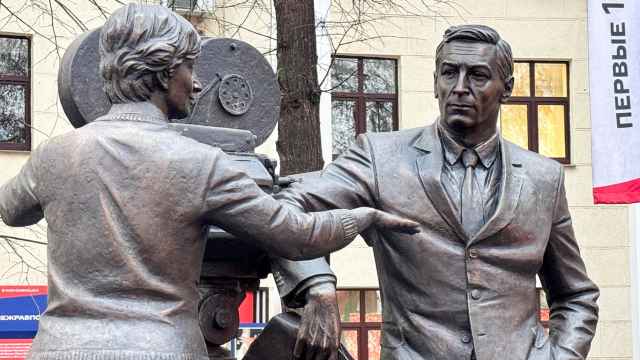The smart aleck with a big head is a perennial favorite in literature. He provides a good source of drama and insight into human behavior.
Henrik Ibsen’s “Peer Gynt” is one of the most famous plays with an antihero of this sort. Gynt is a young man who seems to think the world owes him a life. That wouldn’t be so out of the ordinary, were it not for this: Gynt also believes the world owes him a life on his own terms.
Does he ever have a few things to learn! And, indeed, “Peer Gynt” is a chronicle of the tests a young man armed with an abundance of hubris must pass.
At the Lenkom Theater, Mark Zakharov took Ibsen’s very big play and shaved it down to a quick romp through the main points of the story. One understands Zakharov’s impulse to edit a five-act play written in verse. What is less clear is how this radical cut is expected to tell the story satisfactorily.
Peer (Anton Shagin) is a spoiled kid with a poetic nature and a chip on his shoulder, an all-consuming desire to sate his hungers, an overbearing mother (Alexandra Zakharova) and a mysterious shadow of sorts who follows him around and goes by the moniker of the Button-maker (Sergei Stepanchenko).
Whether or not the Button-maker is an emissary of God or the devil is never entirely certain. But he does have a way of popping up unexpectedly at crucial moments, while tossing off a few words of wisdom or a threat or two.
The adventures of the tale are a mix of the realistic and the fantastic, often with a woman as the catalyst. Gynt has a soft spot for women and that gets him in trouble with humans and trolls alike.
While attending the wedding of Ingrid (Svetlana Ilyukhina), a girl he once fancied, Gynt ends up stealing the bride and both falling in love with — and alienating — the beautiful young Solveig (Alla Yuganova). Before long, Peer is chatting up pretty girls in the kingdom of the trolls and finding himself on the verge of becoming the son-in-law to the local king.
As played by Viktor Rakov, the troll king provides some of this show’s most focused and humorous moments.
This levity, too, however, ends in disaster when Peer defies the king and is beaten within an inch of his life.
From there Peer is launched into the great, wild world and the hands on the clock speed up in a supernatural way.
Encounters with Arab terrorists give way to a confrontation with a sick psychiatrist in an asylum. Here, for a moment, Gynt is cast by Zakharov as something of a political dissident — “What if I don’t agree with your government?” he asks.
“That’s why we’ve been watching you,” the doctor responds darkly.
Meanwhile, Gynt’s mother dies and Gynt himself, now at the age of 60, admits he wants a new life.
If anything might redeem Gynt’s wayward life it might be the love of Solveig, who keeps him in her heart her entire life long even as she goes into decline and loses her sight. Or so, in any case, this is what Zakharov’s production seems to suggest.
To be honest, it is a hard pill to swallow.
The problem is that Zakharov doesn’t create a journey of discovery for Gynt. We do not actually follow him through trials and tribulations, which reveal his character, thus making of him a figure of interest to us — and Solveig as well.
Instead, Zakharov constructs the dramatic tale as one might a bus tour of a big city. The bus stops at all the points of interest, the tourists quickly snap their pictures out the windows and then the driver hurries on again for the next destination.
The kidnapping of Ingrid, like the encounters with Solveig, the trolls, the terrorists and the psycho psychiatrist, are little more than insignificant episodes that add up to nothing.
Visually, as is always true of a Zakharov production, this show is big and intriguing. Designer Alexei Kondratyev built a huge box at center stage that easily transforms into whatever interior or exterior is necessary at any given moment. Choreographer Oleg Glushkov, who emerged this season as one of Moscow’s most in-demand masters of movement, effectively staged the fights and dances that accompany Gynt from place to place.
What is missing, however, is a reason to understand, or to care about, this unthinking, self-absorbed character.
“Peer Gynt” plays July 1 and 2 at 7 p.m. at the Lenkom Theater, located at 6 Malaya Dmitrovka. Metro Pushkinskaya. Tel. 699-9668, . Running time: 2 hours, 20 minutes.
A Message from The Moscow Times:
Dear readers,
We are facing unprecedented challenges. Russia's Prosecutor General's Office has designated The Moscow Times as an "undesirable" organization, criminalizing our work and putting our staff at risk of prosecution. This follows our earlier unjust labeling as a "foreign agent."
These actions are direct attempts to silence independent journalism in Russia. The authorities claim our work "discredits the decisions of the Russian leadership." We see things differently: we strive to provide accurate, unbiased reporting on Russia.
We, the journalists of The Moscow Times, refuse to be silenced. But to continue our work, we need your help.
Your support, no matter how small, makes a world of difference. If you can, please support us monthly starting from just $2. It's quick to set up, and every contribution makes a significant impact.
By supporting The Moscow Times, you're defending open, independent journalism in the face of repression. Thank you for standing with us.
Remind me later.







